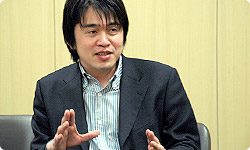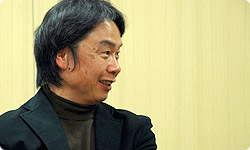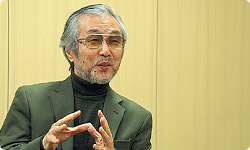7. Hidden Talent All Around the World
Now I'd like to ask everyone about how they think use of Flipnote Studio will spread. What do you think, Koizumi-san?
In my first year in the department of media arts at university, there was a class in which everyone had to direct their own film. Students who wanted to be screenwriters or cameramen, everyone, had to make a film on eight-millimetre as a director. Eight-millimetre film for three minutes.
Each student took on the role of director and made a three-minute film.
Right. I thought doing that was a really good assignment. Everyone would like to make a film, but hardly anyone ever has the chance. But now that anyone can easily make animation with Flipnote Studio, unexpected people now will be able to display unexpected talent. I hope Flipnote Studio spurs them on to do so.
As if Flipnote Studio has uncovered hidden talent somehow?
Exactly. Someone at the Tokyo office who wasn't a designer or programmer made something incredible on it. When I saw it, I thought, “Aha!”

Kotabe-san, the animation that users have made with Flipnote Studio can be posted on the Internet and shared with others. People with hidden talent all over the world are being given an equal chance to share their work globally.
That's exciting!
I'm excited, too!
What do you think, Miyamoto-san?
I'm of a like mind with Koizumi-san, but…I think I'm going to use this opportunity to do some PR for Wii Music. (laughs)
(laughs)
Wii Music is very similar to Flipnote Studio. For a long time Nintendo has worked on developing games like editing tools. I think the ultimate video game is a computer-aided design tool. I've always said that if we had the perfect tool to, for example, allow you to draw a picture however you wanted, it would be the most enjoyable software, but it was very hard to achieve.
It was too expensive or it was difficult to use, so the burden placed on users was too great.
It's one theme we have continued to approach as we have made games all these years. In 2008 we completed Flipnote Studio and Wii Music. I hope people will someday come forward who say they wanted to become musicians because of Wii Music or creators because of Flipnote Studio. In that light, I feel like the year 2008 marked a new era.

Band Brothers DX is a little different type of game, but you can share your music with others.
Indeed, 2008 was a bountiful year! It is often said that those kinds of projects don't go that well, but I have a feeling they will go well in the very near future, like in the year 2009 and 2010.
Also, Made In Ore20 is coming out in 2009.
20 Made in Ore (Japanese title): Nintendo DS software scheduled for release in Japan in 2009. Software that allows players to make and play the microgames appearing in the WarioWare series.
I want each player to use such games to make forms of play specific to him or herself. Back in the days when, as Kotabe-san experienced, people would scoff at drawing manga, I started a manga club in junior high school. Our slogan was “Better at Art than the Art Club.” (laughs)
(laughs)
But the truth was, we were better than the art club! And we got better grades in Art than they did.
You overturned the existing authority and tried to make it to recognise you!
In the same way, I hope Flipnote Studio will usher in a new era.
Kotabe-san, seen from the viewpoint of your life spent mastering the art of animation, what do you think when you see something like Flipnote Studio suddenly appear?
As I mentioned before, it's very approachable, which I think is incredible. Even drawing flick book animation was, until today, reserved for children who were better at drawing. However, with the Nintendo DS, anyone can churn out some drawings and get them moving. Also, I think there are many ways to use it. For shiritori-anime21, for example.
21 Shiritori is a word game where the players say a word that begins with the last Japanese letter of the previous word.
Shiritori-anime?
I've heard they actually do this at animation schools. You start with a circle, for example, work it through a number of changes, and then end with a circle. If everyone makes something that starts with a circle and ends with a circle, then all their creations can be linked.

I see. It's like shiritori because the endings and beginnings link up.
You can edit them together into one animation.
In Version 2 we're going to include a function that allows memos to be lined up and played for consecutive viewing up to 30 minutes.
In other words, you can hook up works by multiple creators into one continuous animation lasting 30 minutes.
We need to provide a starting form.
We'll do that in Version 2 also.
I'm excited about it.
Me too! (laughs)
Earlier, Koizumi-san mentioned uncovering hidden talent, but I think Flipnote Studio can be a fun tool for professionals, too.
It would be great if, when this software goes out into the world, the number of people who draw animation would increase. I also strongly hope that - as Miyamoto-san mentioned – Flipnote Studio spurs people on to become animators, video and film creators and video-game makers.
Kotabe-san, thank you for this memorable conversation today.
Afterward, we asked Yoichi Kotabe to create his own animation using Flipnote Studio.